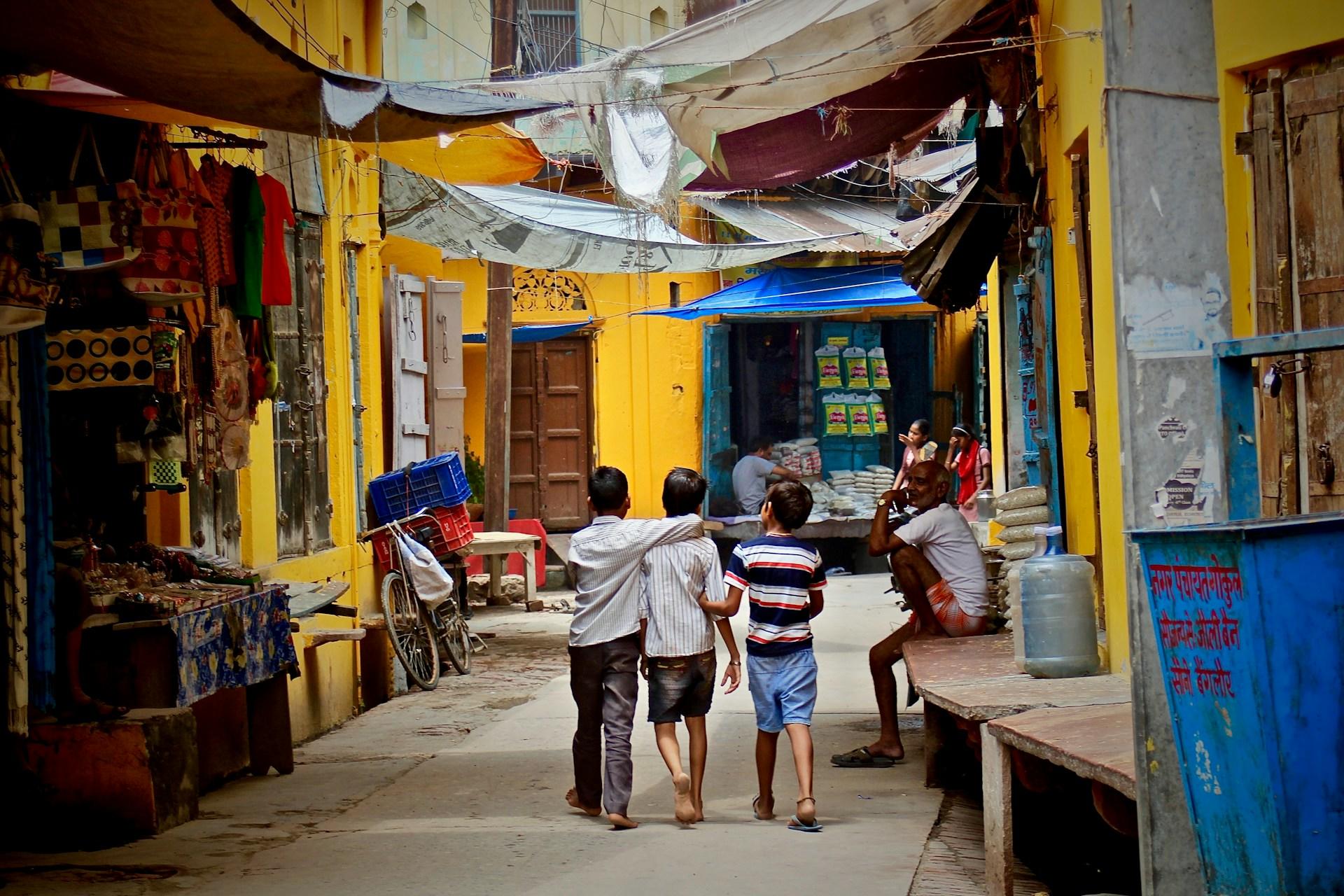First things first, is Hindi the only national language of India? Short answer, no! It is one of the biggest though, alongside English, Tamil, Marathi, Punjabi, Telugu and others. Hindi is native to northern India and Pakistan, where the Hindustani language or dialect is called Urdu. Obviously, learning Hindi takes a long time. You need to learn not just the Hindi alphabet and pronunciation, but all the grammar rules, such as the different verb tenses, how to make an adjective agree with a noun and proper sentence structure.
Let's start with some Hindi words to ease you into learning.

The Importance Of Hindi
Whether it is spirituality, food, art, architecture or industry that has led you to want to learn Hindi, Hindi is a great language to learn, and the learning process doesn't have to be difficult. Hindi is the most widely spoken language in India and derives from Sanskrit, written in the Devanagari script.
Because of their similarities, learning how to speak Hindi will help you to speak Sanskrit, Urdu, Nepalese, Bengali, and Gujarati. One other thing to note is that Hindi is written from left to right, so that’s a good start too, right? At least this is something that English speakers are familiar with!
One of India’s most challenging languages to learn, predominantly spoken in the southern state of Kerala, Malayalam is renowned for its complex script and sophisticated grammar, making it a particularly demanding language to master.
It’s also fairly easy to read Hindi as words are generally written as they are pronounced because each character of the Hindi alphabet has a different sound.
Hindi Formal Registers
When we speak English, we have several registers in which we talk:
- The formal (used with persons of authority or strangers)
- The informal or colloquial (for friends and family).
In Hindi, there are many more subtleties to the formal and informal registers. There can be several versions of formal speak, depending on the rank of the person you are talking to (whether in terms of caste or just your boss), and their relationship with you. There are also several informal registers, variations from friendly to intimate.
This is hard for Hindi translators to convey. Words might appear as synonyms and have the same English translation, but belong to different levels of formality. There are many approaches to learning including immersion. You can read Hindi newspapers and improve your Hindi language skills.
Hindi Greetings and Salutations
1. Hello
Knowing how to say hello in Hindi is the bare minimum. The Hindi word for “hello” is namaste - literally, “I bow to you” - which they will. Though some Indians will shake hands, most bring their palms together in front of their chest, fingers up, and bow slightly. You can also say namaskaar or, as a respectful greeting to superiors or elders, pranaam. You can say these Hindi words of greeting at any time of day.
If you are speaking Urdu (a language with a lot of Persian and Arabic words), you will say assalaam-aleikum, “may God be with you”, a phrase that the Muslim people of Pakistan took from Arabic.
“Hi” is suno or suniye.
2. Good-bye
Knowing how to say goodbye in Hindi is super easy. When leaving, you might say namaste again, or phir milenge (”see you”). A casual “bye” is alvida, whereas a more formal “farewell” is vidai.
3. Good morning!
Suprabhaat is the Indian greeting for "good morning".
4. Good evening!
Shubh sundhyaa
5. Welcome!
When welcoming someone you know very well, use aaiye and padhariye!
When welcoming a stranger, use swagt.
6. Nice to meet you
"Nice to meet you" is aap se milkar khushi hui
7. How are you?
Saying "how are you":
- To a man or a group of people: Aap kaise hain?
- To a woman or a group comprised only of women: Aap kaisi hain?
There are also casual ways to ask "how are you?" in Hindi, including:
8. I am fine
9. What is your name?
10. My name is…
My name is…
Meraa naam (insert name here) hain.
This sentence is not modified according to gender - it’s the same phrase whether it is spoken to a man or a woman.
11. See you (tomorrow)
12. What's new?
13. Nothing much

Being polite in Basic Hindi
14. Please
Kripaya, used at the beginning of a sentence.
15. Thank you
It is important to know how to say thank you in Hindi, and to be polite when you are in India. When you look in your English-Hindi dictionary for the Hindi translation of “thank you”, you will find dhanyavaad. However, it is important to note that this word is not used lightly in the Indian language.
Thanks for everyday things such as handing someone their Hindi dictionary or holding open the door are implied. The word “dhanyavaad” is frequently used for very big favours and almost never with family or intimate friends - whom you can inadvertently insult if you thank them!
16. You’re welcome (as a reply to “thank you”)
In case someone else has thanked you (no headache there), here are some ways you can say “You’re welcome”:
17. Excuse me, sorry
How do you say excuse me or "sorry" in Hindi?
Like many other aspects of the Hindi tongue, there are several registers for the expression “excuse me”, depending on the formality. This is one thing where Hindi to English translation dictionaries and apps often fail:

18. The forms of “you”
Some languages have a formal “you” and an informal “you” (English has lost its informal “you”).
Hindi has formal, informal and intimate. Knowing how intimate is intimate enough is difficult, however, so it’s better to err on the side of caution and use the informal with friends and family.
Depending on who you are addressing, you should use:
| Register | To whom? | Word |
|---|---|---|
| Formal/respectful | Elders, superiors | Aap |
| Informal | Good acquaintances, friends | Tum |
| Intimate | Good friends and siblings, lovers | Tu |
19. Mister, Mrs.
While you can use Mistar and Misez for Mr. and Mrs, the Indian designations are Sri and Srimati.
When addressing someone, adding -jee after their name is a sign of respect:
Mataa (mother) = mataa-jee
Pitaa (father) = pitaa-jee
Getting Around in Hindi: Buying and Getting Places
Hopefully, if you get the chance to learn Hindi with an immersion holiday, you will also be doing some shopping - and hopefully more than just at the pharmacy! Here are some simple phrases you might need in shops (and to help you get there!) Rather than having to translate English into Hindi on an app on your phone, try to pick up the basics first

20. How much is this?
Not everything is priced in the shops, so you need to know this important phrase: Ye kitane ka hai.
21. I like this
When presented with several options in a shop (the red or the blue saree?) you should use these Hindi phrases:
22. I am hungry / thirsty
When on your shopping spree, if you ever feel peckish (or thirsty) and want to go get something to eat, say:
23. Right and left and middle
When searching for the perfect gift, you might need some Indian-language directions to get to the right store.
Right: data
Left: baya
Middle: madhya
Straight: sidha
24. Means of transportation
And of course, you need to know how to get there! Here’s how to translate words for modes of transportation:
- Taxi: taiksi
- Train: tren, relgari
- Subway: sabwe, bhumigat paidal par path
- Bus: bas
- Bus stop: bas stap

Other Useful Hindi Phrases for English Speakers
Here are some ready-to-use Indic phrases to help you out when travelling on the Indian subcontinent.
25. I’m not feeling well.
This sentence is important if you are feeling ill and need to lie down or get to a doctor.
Mujhe theek nhi lg rha.
26. Can you help me?
If you are among strangers, you need to know how to ask for help without an English dictionary:
Kya aap meri madad kar sakte hain?
Or, in an urgent situation, just “help”:
- madad
- sahayata
27. Words for “doctor” and “police”
The translations from English to Hindi are easy in this case, as the words are taken from English:
- Doctor is daktar
- Police is polis
28. Do you speak English?
While many language courses like to teach you “Do you speak Hindi?” as one of the first phrases in a new language, learning how to say “Do you speak English?” is much more useful for a beginner Hindi speaker.
Kya ap angrezi bolte/bolti (m/f) hai?
29. I don’t speak Hindi
You might sometimes be addressed by people who want to help or just sell you something. Either way, you should tell them this:
Mujhe hindi nahi ati hair. (I don’t speak Hindi.)
30. I don’t understand.
Mai samjha/samhi nahi.
31. Talk more slowly
Sometimes the problem isn't so much that the person is using new words you don’t know, but that you can’t tell because they are talking so fast your brain can’t catch up and translate it all to English by the time they’ve finished the sentence. You ask them, so speak more slowly:
Dhire dhire boliye.
32. What does it mean? How do you say it?
Of course, everyone appreciates it when someone makes an effort in learning their language. Since many Hindi speakers speak fair to good English, you can try asking these questions, and you'll have a good chance of understanding the answer:
What does [insert Hindi word] mean? […] ka artha/matlab kya hai?
How do you say [insert English words]? […] kaise kahate hai?
Professions In Hindi
Meanwhile, looking for a particular tradesman, craftsman, or service is quite common when travelling or when relocating, so here are just some of the most common professions in Hindi. Furthermore, you may wish to use these terms when speaking to a local and explaining to them what you do for a living.
33. Doctor
daaktar
34. Lawyer
vakeel
35. Dentist
dentist
36. Cook
rasolya
37. Banker
mahaajan
38. Secretary
sachiv
39. Gardener
kaachhi
40. Farmer
kisaan
41. Carpenter
badhi
42. Architect
vaastukaar
43. Postman
daakiya
44. Pilot
viman chalak
45. Teacher
adhyaapak
One Last Lesson From Us: Learning Hindi Numbers!
When confronted with Hindi vocabulary, one thing that seems to stump a lot of people are the Hindi numbers. Hindi uses a decimal system, and as long as you are counting from one to ten, it’s literally a simple matter of memorisation and logic. After that, they function along the principles of prefix (unit) + suffix (decimal). Thus, pentsadh is 65, chavti is 34.
| Numeral | Word | Prefix | Decimal suffix | Decimal name (20, 30, 40) |
|---|---|---|---|---|
| 1 | ek | ik- | -ah | das |
| 2 | do | ba- | -bis | bees |
| 3 | tin | te- or ti- | -tis | tis |
| 4 | char | chav- | -lis | chalis |
| 5 | panch | pent- | -an | pachas |
| 6 | cheh | chiya- | -sadh | saadh |
| 7 | saat | sata- | -hatar | sattar |
| 8 | aath | adha- | -asi | assi |
| 9 | nao | un- (-1) + the suffix of the next decimal up (unnasi = 80-1 = 79 | -ave | nabbe |
| 10 | das | ek sau |
- Eleven is gyaarah.
- 99 is ninyaanave, NOT un-ek-sau
Look here for the Devanagari numerals. If you wish to learn and have fun, check out our previous article about Hindi quizzes and games. To practise your Hindi, why not get yourself a “word of the day” calendar in Hindi? Or, once you’ve progressed a little beyond beginner status, read Hindi poets - poetry often uses interesting and unusual words.
Summarise with AI:
















THANKS
I LOVE THIS
Thanks for the comment, glad you found the article helpful! 😊